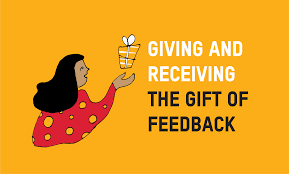Questions Not to Ask When Giving & Receiving Feedback

Last month’s blog noted that, when it comes to feedback, clear is kind. That blog assumed we were giving feedback to someone who reports to us, and that we’re the manager. But what if you have feedback for someone who doesn’t report to you? Or what if you want to ask someone else for feedback?
Bad question #1: “Would you like some unsolicited advice?”
No. Please, no. But if you said to me “I have an observation about your communications from that meeting we were just in; would it be helpful to you if I shared it?” I will definitely say “yes.”
Same rules as outlined in last month’s blog: we give feedback out of care for the other person’s growth and development. We don’t give feedback out of irritation. Check your motives before you offer feedback. Chances are if it’s something you’d want someone to clue you in on, they may want to know, too. Just ask for permission and see if they are open before laying your wisdom on them.
And still expect that they might not receive the feedback well in the moment. They may start to explain themselves or go quiet. Just stay open and calm for them – and maybe read the tips in last month’s blog before offering feedback!
Bad question #2: Do you have feedback for me?
It’s great to desire feedback so you can continue to improve your performance, communications and relationships. But asking a big question like “do you have feedback for me?” may not get you use-able information. Remember that not everyone is skilled at giving feedback – and an easy way out for the other person is to tell you that you are perfect!
Instead, try to narrow your question. Here are a few examples:
– “During the meeting we were just in, I explained the progress on the project; was anything unclear in my explanation?” And/or “what would have made it better?”
– “During the meeting we were just in, our boss asked me why I chose the actions I took; did my answer sound defensive?” And/or “how would you have answered his question?”
– “We’ve been working on this project together now for a month; what have you observed about my interactions with the team that I do well?” And/or “what could I do better?”
Asking someone what they observed/experienced is safe territory – so is asking for their advice or opinion, if you honestly want it. Remember that another person’s feedback is just their opinion, so use your discernment before changing your behavior. (You may need to get feedback from more than one person to determine if you need to change your behavior.)
In addition, if you have more than one feedback question, make sure to ask only one at a time and let the person answer. You can ask a clarifying question, but allow room for the other person to think if they are struggling to come up with feedback on the spot. If they want more time to think, that’s fine; you can check in later.
Feedback is a valuable gift they are giving you (that you requested), so try not to pressure them too much – and definitely don’t defend yourself! All you ever need to to say to someone giving you feedback is “thank you; you’ve given me something to think about.”
What a gift!
p.s. As always, your comments are welcome on this post at https://www.facebook.com/jenfrankcoaching.

